Unit 2 Travelling Revision课件(25张)
文档属性
| 名称 | Unit 2 Travelling Revision课件(25张) | 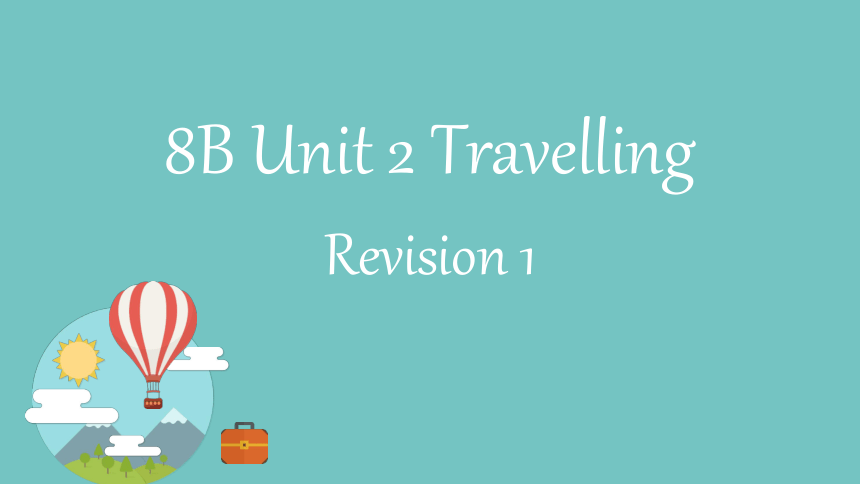 | |
| 格式 | pptx | ||
| 文件大小 | 2.5MB | ||
| 资源类型 | 教案 | ||
| 版本资源 | 牛津译林版 | ||
| 科目 | 英语 | ||
| 更新时间 | 2022-03-17 22:03:35 | ||
图片预览

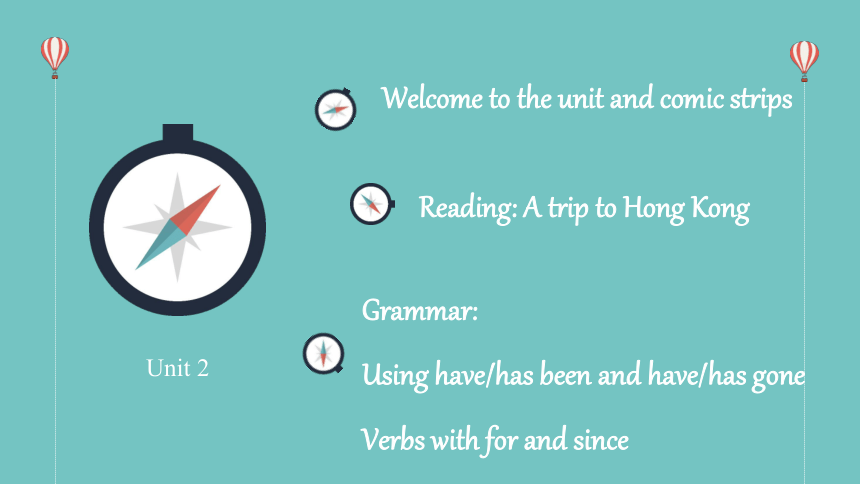
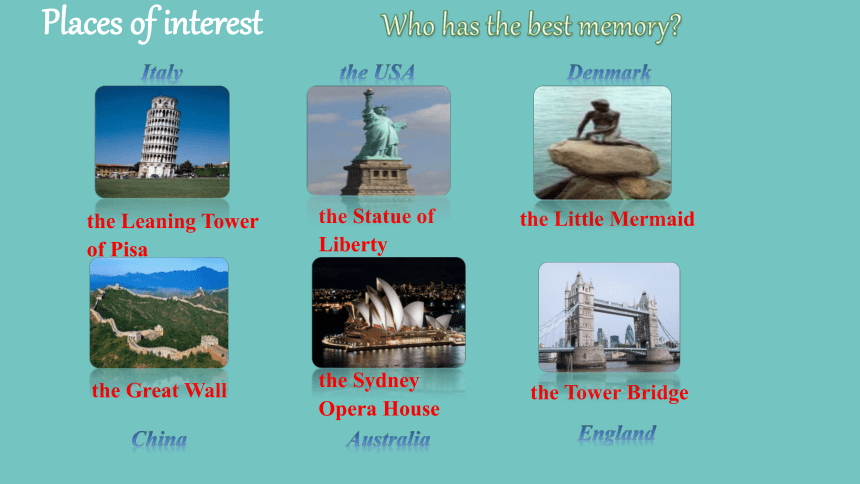
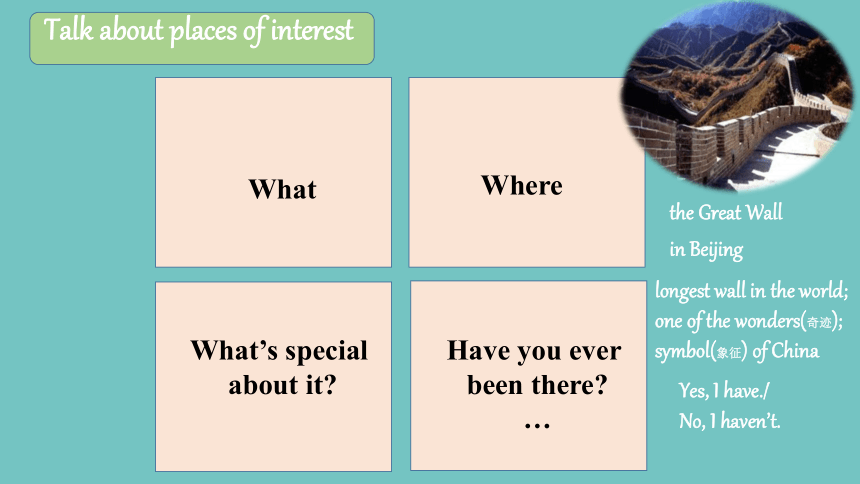
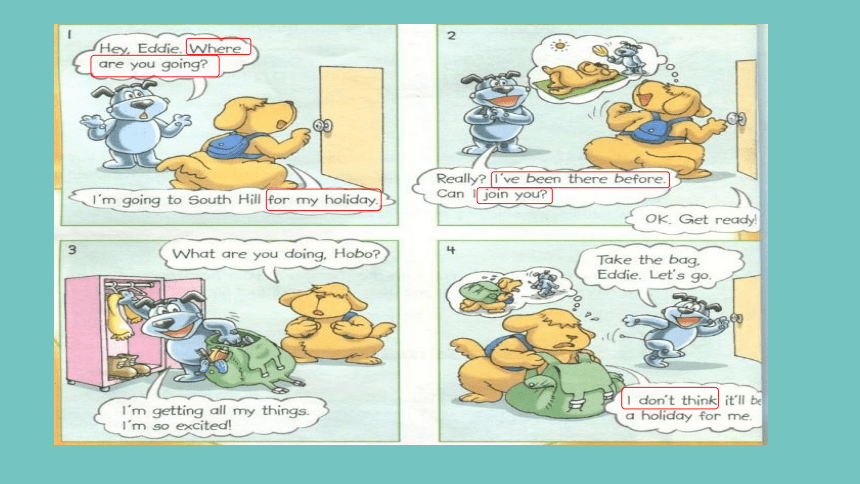

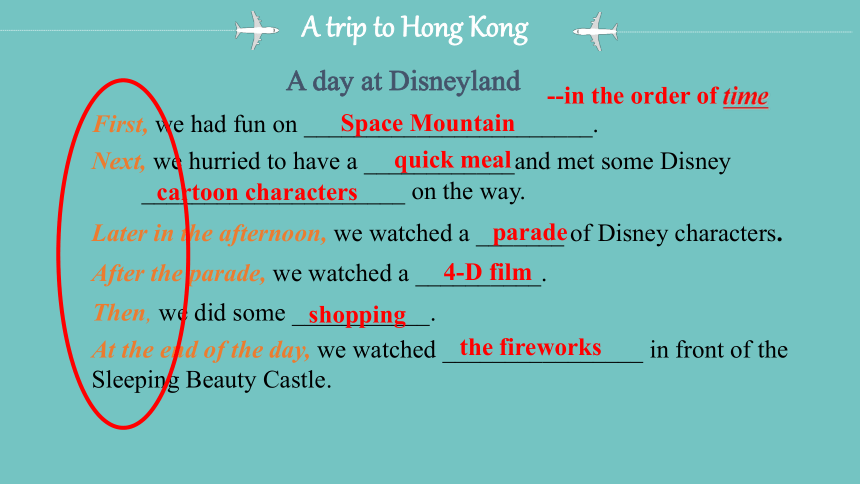
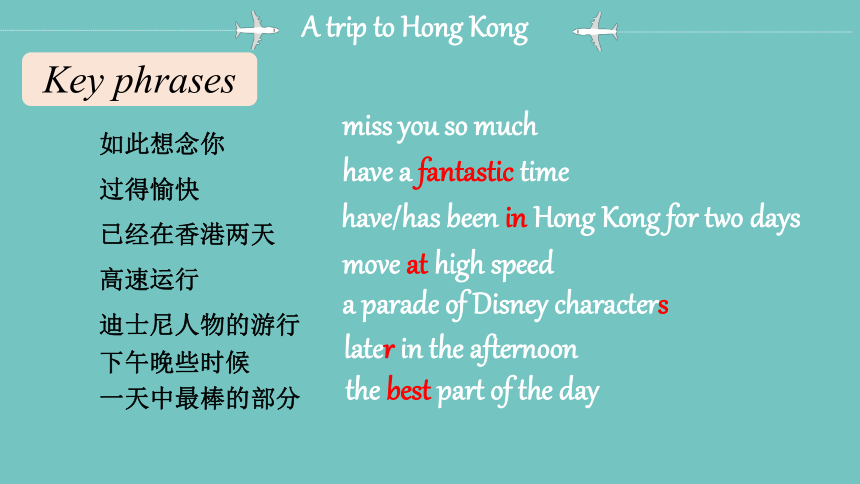
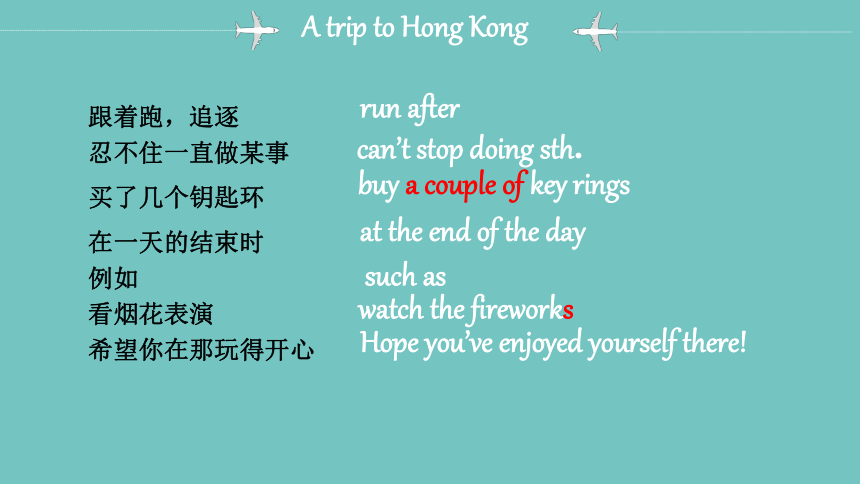
文档简介
(共25张PPT)
8B Unit 2 Travelling
Revision 1
Unit 2
Welcome to the unit and comic strips
Reading: A trip to Hong Kong
Grammar:
Using have/has been and have/has gone
Verbs with for and since
the Great Wall
the Leaning Tower of Pisa
the Statue of Liberty
the Little Mermaid
the Tower Bridge
the Sydney
Opera House
Who has the best memory
Italy
the USA
Denmark
China
Australia
England
Places of interest
Talk about places of interest
What
Where
What’s special
about it
Have you ever
been there
…
the Great Wall
in Beijing
longest wall in the world;
one of the wonders(奇迹);
symbol(象征) of China
Yes, I have./
No, I haven’t.
否定前置:当主句的主语是第一人称,谓语动词是think, believe, suppose等表示“观念、信念、猜测”等心理活动的词语时,若宾语从句为否定句时,要将从句的否定转移到主句中。
I don’t think it’ll be a holiday for me.
I don’t think it’s a good idea.
I don’t believe he will come to the party.
主句
宾语从句
我觉得男生不喜欢购物。________________________________
I don’t think boys like shopping.
A day at Disneyland
First, we had fun on _______________________.
Space Mountain
Next, we hurried to have a ____________and met some Disney
_____________________ on the way.
quick meal
cartoon characters
Later in the afternoon, we watched a _______ of Disney characters.
parade
After the parade, we watched a __________.
4-D film
Then, we did some ___________.
shopping
At the end of the day, we watched ________________ in front of the Sleeping Beauty Castle.
the fireworks
--in the order of time
A trip to Hong Kong
如此想念你
过得愉快
已经在香港两天
高速运行
迪士尼人物的游行
下午晚些时候
一天中最棒的部分
have a fantastic time
have/has been in Hong Kong for two days
later in the afternoon
the best part of the day
move at high speed
miss you so much
a parade of Disney characters
A trip to Hong Kong
Key phrases
跟着跑,追逐
忍不住一直做某事
买了几个钥匙环
在一天的结束时
例如
看烟花表演
希望你在那玩得开心
run after
can’t stop doing sth.
buy a couple of key rings
at the end of the day
such as
watch the fireworks
Hope you’ve enjoyed yourself there!
A trip to Hong Kong
I miss you so much!
What did you miss most when you were in France (想念,思念)
If I don’t leave now, I’ll miss my plane. (赶不上,错过)
When did you first miss the necklace (丢失)
The hotel is the only white building on the road—you can’t miss it .(未见到,未察觉)
He completely missed the joke.(不理解,不懂)
A trip to Hong Kong
我从不错过踢足球的机会。__________________________________________
我已经离开家两周了,我非常想念父母。
__________________________________________________________________
Word in use
I never miss a chance of playing football.
I have been away from home for two weeks and I miss my parents very much.
2. We’re having a fantastic time here.
have a fantastic time= have a good/great/wonderful time
a fantastic beach
a fantastic achievement (成就)
— How did you find the trip to the West Lake
— _______________________.
The guide took us there.
First by train then by bus.
Very fantastic indeed.
It was not far from our hotel.
3. It moved at high speed and was really exciting.
n. at high/low speed 以高速/低速行驶
at full/top speed 以全速/最高速行驶
travel at the speed of sound/light
speed limit 最高车速限制
v. speed up 加速 The train soon speeded/sped up.
1. Melting ice can cause the sea level to rise. Since 1993, the sea level has risen ________ 32cm every 10 years.
A. at the end of B. at the foot of C. at the speed of D. at the bottom of
2. It is dangerous to drive your car___________________.(高速)
at high speed
4. I ran after them and couldn’t stop taking photos.
cannot stop doing sth. 忍不住一直做某事,不停地做某事
The little baby couldn’t stop crying when he saw his mother again.
At lunchtime, Laura always ___________________________ her friends(忍不住和朋友聊天).
We________________________ (不停地大笑) while watching the movie.
cannot stop chatting with
couldn’t stop laughing
5. At the end of the day, I bought a couple of key rings for classmates.
at the end of…, 在…的末尾,在…的尽头
e.g. At the end of last year, I went to visit my friend in Beijing.
in the end: 最后,最终,与finally, at last同义
e.g. In the end, he came up with a good idea and worked out the problem.
在电影的结尾,他们实现了自己的梦想。
___________________________________________________________________
2. 最后,她在朋友的帮助下完成了工作。
__________________________________________________________________
At the end of the movie, they realized their dream.
In the end, she finished her job with the help of her friends.
Grammar : Using have/has been and have/has gone
have/has been to +s . p ( +次数):去过某地,已回;
e. g. My parents have been to the Great Wall once, but I have never been there.
have/has gone to + s . p :去了某地 ,未回,主语通常是第三人称
e. g. Miss Brown has gone to the bookshop.
have/has been in s . p (for+一段时间):在某地待了一段时间
e. g. He has been in London for half a month.
当后面跟的地点是副词home/here/there时,介词省略
用has/have been, has/have gone填空
1. I __________ to Canada many times. It’s very beautiful.
2. —Where is my sister, mum
— She _____________to the supermarket. She will be back soon.
3. Doctor Green ____________ to Suzhou twice.
4. Julie’s grandparents are not at home and they __________ to Beijing .
Grammar : Using have/has been and have/has gone
have been
has gone
has been
have gone
1. Mr. Smith, together with his wife, _______Shanghai for about five months.
A. has left B. have left
C. has been in D. have been in
2. — Is the girl your cousin
— It________ her. She __________ Shenzhen and hasn’t come back.
A. can’t be; has gone to B. mustn’t; has been in
C. can’t be; has been to D. should be; has gone to
3. The professor reached Nanjing last Monday. He______ there for 10 days.
A. has got B. has been C. has arrived D. has reached
4. —Excuse me, is Mr. Green in the office
一No. He ________ Singapore for a meeting. He will be back in a few days.
A.have gone to B. has gone to C.have been to D.has been to
Grammar : Using have/has been and have/has gone
Grammar : Verbs with for and since
We use for to talk about a period of time(时间段).
We use since when we talk about a time point in the past.
Fill in the blanks with for or since.
_________ 1998
2. _________half an hour
3. _________ I was born
4. _________ ten minutes ago
5. _________ a couple of years
6. _________ John married Wendy
过去的某一时间点
since + 一段时间+ ago
从句
since
for
since
since
for
since
延续性动词和非延续性动词都可以用于完成时的句子中。但如果句中
含有表示持续时间的时间状语,则要用延续性动词,非延续性动词需要转
化为延续性的表达方式。
e.g. The shopping mall has opened.
The shopping mall has been open for half a year.
延续性动词
一个动作可以持续一段时间
例如:work, wait, write, walk, live, do, drive, keep, study, sleep 等
非延续性动词
动作发生在一瞬间,非常短暂
例如:come, go, buy, leave, reach, stop. borrow, close, die, lend等。
Verb Used for a continuous state
begin/start
finish/stop
come/go/arrive
leave
borrow
join
marry
die
have/has been on
have/has been over
have/has been in/at
have/has been away
have/has kept
have/has been in
have/has been a member of
have/has been married
have/has been dead
Verb Used for a continuous state
buy
open have/has been open
close
fall asleep
become ill
get to know
get married to have/has been married to
have/has known
have/has been ill
have/has been asleep
have/has been closed
have/has had
1. I have bought the book for 3 months.
2. My brother has joined the army since he was 18.
3. Jack and Tom have lived here since 5 years.
4. The film has been on since I have come to the cinema.
5. His grandfather has been died for two years.
have had
has been in/been a member of
for
Correct the following sentences
came
dead
1.这本书我已经借了两星期了,明天我会还给Amy.
I _____ _____ the book ____ two weeks. I will return it to Amy tomorrow.
2.会议已经开始一个小时了.
The meeting _____ _____ _____ for one hour.
3.我加入英语俱乐部半年了.
I _____ _____ _____ the English Club for half a year.
4.他们结婚十年了.
They _____ _____ __________ _________ ten years ago.
5.我的表弟离开北京两周了.
My cousin _____ _____ _____ _____ Beijing _____ two weeks.
6.这家商店营业已经三天了.
The shop _____ _____ _____ for three days.
have kept for
has been on
have been in
Exercise 2. Blank-filling
have been married since
has been away from for
has been open
Homework
Check your notes.
Finish the exercise.
Feel free to ask questions.
THANKS
8B Unit 2 Travelling
Revision 1
Unit 2
Welcome to the unit and comic strips
Reading: A trip to Hong Kong
Grammar:
Using have/has been and have/has gone
Verbs with for and since
the Great Wall
the Leaning Tower of Pisa
the Statue of Liberty
the Little Mermaid
the Tower Bridge
the Sydney
Opera House
Who has the best memory
Italy
the USA
Denmark
China
Australia
England
Places of interest
Talk about places of interest
What
Where
What’s special
about it
Have you ever
been there
…
the Great Wall
in Beijing
longest wall in the world;
one of the wonders(奇迹);
symbol(象征) of China
Yes, I have./
No, I haven’t.
否定前置:当主句的主语是第一人称,谓语动词是think, believe, suppose等表示“观念、信念、猜测”等心理活动的词语时,若宾语从句为否定句时,要将从句的否定转移到主句中。
I don’t think it’ll be a holiday for me.
I don’t think it’s a good idea.
I don’t believe he will come to the party.
主句
宾语从句
我觉得男生不喜欢购物。________________________________
I don’t think boys like shopping.
A day at Disneyland
First, we had fun on _______________________.
Space Mountain
Next, we hurried to have a ____________and met some Disney
_____________________ on the way.
quick meal
cartoon characters
Later in the afternoon, we watched a _______ of Disney characters.
parade
After the parade, we watched a __________.
4-D film
Then, we did some ___________.
shopping
At the end of the day, we watched ________________ in front of the Sleeping Beauty Castle.
the fireworks
--in the order of time
A trip to Hong Kong
如此想念你
过得愉快
已经在香港两天
高速运行
迪士尼人物的游行
下午晚些时候
一天中最棒的部分
have a fantastic time
have/has been in Hong Kong for two days
later in the afternoon
the best part of the day
move at high speed
miss you so much
a parade of Disney characters
A trip to Hong Kong
Key phrases
跟着跑,追逐
忍不住一直做某事
买了几个钥匙环
在一天的结束时
例如
看烟花表演
希望你在那玩得开心
run after
can’t stop doing sth.
buy a couple of key rings
at the end of the day
such as
watch the fireworks
Hope you’ve enjoyed yourself there!
A trip to Hong Kong
I miss you so much!
What did you miss most when you were in France (想念,思念)
If I don’t leave now, I’ll miss my plane. (赶不上,错过)
When did you first miss the necklace (丢失)
The hotel is the only white building on the road—you can’t miss it .(未见到,未察觉)
He completely missed the joke.(不理解,不懂)
A trip to Hong Kong
我从不错过踢足球的机会。__________________________________________
我已经离开家两周了,我非常想念父母。
__________________________________________________________________
Word in use
I never miss a chance of playing football.
I have been away from home for two weeks and I miss my parents very much.
2. We’re having a fantastic time here.
have a fantastic time= have a good/great/wonderful time
a fantastic beach
a fantastic achievement (成就)
— How did you find the trip to the West Lake
— _______________________.
The guide took us there.
First by train then by bus.
Very fantastic indeed.
It was not far from our hotel.
3. It moved at high speed and was really exciting.
n. at high/low speed 以高速/低速行驶
at full/top speed 以全速/最高速行驶
travel at the speed of sound/light
speed limit 最高车速限制
v. speed up 加速 The train soon speeded/sped up.
1. Melting ice can cause the sea level to rise. Since 1993, the sea level has risen ________ 32cm every 10 years.
A. at the end of B. at the foot of C. at the speed of D. at the bottom of
2. It is dangerous to drive your car___________________.(高速)
at high speed
4. I ran after them and couldn’t stop taking photos.
cannot stop doing sth. 忍不住一直做某事,不停地做某事
The little baby couldn’t stop crying when he saw his mother again.
At lunchtime, Laura always ___________________________ her friends(忍不住和朋友聊天).
We________________________ (不停地大笑) while watching the movie.
cannot stop chatting with
couldn’t stop laughing
5. At the end of the day, I bought a couple of key rings for classmates.
at the end of…, 在…的末尾,在…的尽头
e.g. At the end of last year, I went to visit my friend in Beijing.
in the end: 最后,最终,与finally, at last同义
e.g. In the end, he came up with a good idea and worked out the problem.
在电影的结尾,他们实现了自己的梦想。
___________________________________________________________________
2. 最后,她在朋友的帮助下完成了工作。
__________________________________________________________________
At the end of the movie, they realized their dream.
In the end, she finished her job with the help of her friends.
Grammar : Using have/has been and have/has gone
have/has been to +s . p ( +次数):去过某地,已回;
e. g. My parents have been to the Great Wall once, but I have never been there.
have/has gone to + s . p :去了某地 ,未回,主语通常是第三人称
e. g. Miss Brown has gone to the bookshop.
have/has been in s . p (for+一段时间):在某地待了一段时间
e. g. He has been in London for half a month.
当后面跟的地点是副词home/here/there时,介词省略
用has/have been, has/have gone填空
1. I __________ to Canada many times. It’s very beautiful.
2. —Where is my sister, mum
— She _____________to the supermarket. She will be back soon.
3. Doctor Green ____________ to Suzhou twice.
4. Julie’s grandparents are not at home and they __________ to Beijing .
Grammar : Using have/has been and have/has gone
have been
has gone
has been
have gone
1. Mr. Smith, together with his wife, _______Shanghai for about five months.
A. has left B. have left
C. has been in D. have been in
2. — Is the girl your cousin
— It________ her. She __________ Shenzhen and hasn’t come back.
A. can’t be; has gone to B. mustn’t; has been in
C. can’t be; has been to D. should be; has gone to
3. The professor reached Nanjing last Monday. He______ there for 10 days.
A. has got B. has been C. has arrived D. has reached
4. —Excuse me, is Mr. Green in the office
一No. He ________ Singapore for a meeting. He will be back in a few days.
A.have gone to B. has gone to C.have been to D.has been to
Grammar : Using have/has been and have/has gone
Grammar : Verbs with for and since
We use for to talk about a period of time(时间段).
We use since when we talk about a time point in the past.
Fill in the blanks with for or since.
_________ 1998
2. _________half an hour
3. _________ I was born
4. _________ ten minutes ago
5. _________ a couple of years
6. _________ John married Wendy
过去的某一时间点
since + 一段时间+ ago
从句
since
for
since
since
for
since
延续性动词和非延续性动词都可以用于完成时的句子中。但如果句中
含有表示持续时间的时间状语,则要用延续性动词,非延续性动词需要转
化为延续性的表达方式。
e.g. The shopping mall has opened.
The shopping mall has been open for half a year.
延续性动词
一个动作可以持续一段时间
例如:work, wait, write, walk, live, do, drive, keep, study, sleep 等
非延续性动词
动作发生在一瞬间,非常短暂
例如:come, go, buy, leave, reach, stop. borrow, close, die, lend等。
Verb Used for a continuous state
begin/start
finish/stop
come/go/arrive
leave
borrow
join
marry
die
have/has been on
have/has been over
have/has been in/at
have/has been away
have/has kept
have/has been in
have/has been a member of
have/has been married
have/has been dead
Verb Used for a continuous state
buy
open have/has been open
close
fall asleep
become ill
get to know
get married to have/has been married to
have/has known
have/has been ill
have/has been asleep
have/has been closed
have/has had
1. I have bought the book for 3 months.
2. My brother has joined the army since he was 18.
3. Jack and Tom have lived here since 5 years.
4. The film has been on since I have come to the cinema.
5. His grandfather has been died for two years.
have had
has been in/been a member of
for
Correct the following sentences
came
dead
1.这本书我已经借了两星期了,明天我会还给Amy.
I _____ _____ the book ____ two weeks. I will return it to Amy tomorrow.
2.会议已经开始一个小时了.
The meeting _____ _____ _____ for one hour.
3.我加入英语俱乐部半年了.
I _____ _____ _____ the English Club for half a year.
4.他们结婚十年了.
They _____ _____ __________ _________ ten years ago.
5.我的表弟离开北京两周了.
My cousin _____ _____ _____ _____ Beijing _____ two weeks.
6.这家商店营业已经三天了.
The shop _____ _____ _____ for three days.
have kept for
has been on
have been in
Exercise 2. Blank-filling
have been married since
has been away from for
has been open
Homework
Check your notes.
Finish the exercise.
Feel free to ask questions.
THANKS
